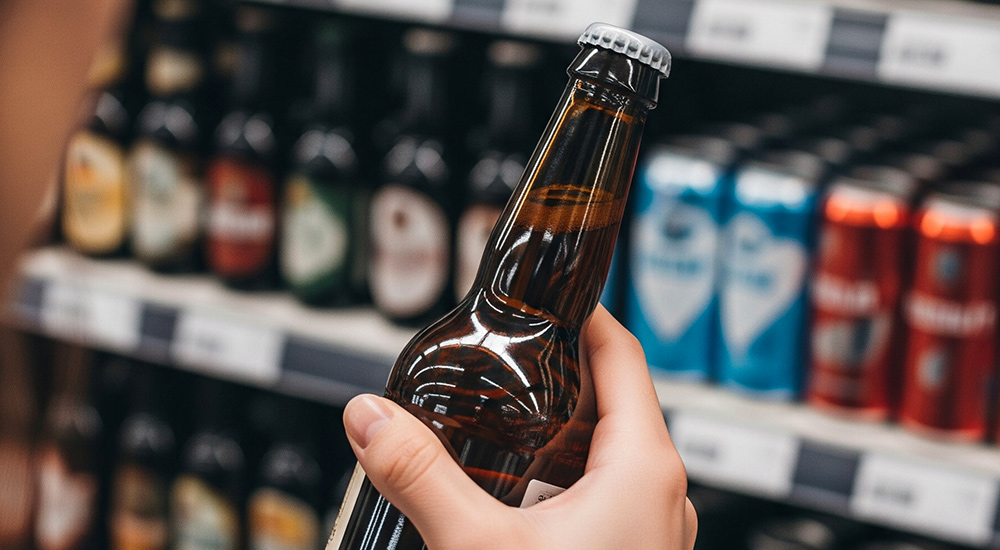New report reveals further growth and key trends in alcohol-free and low-alcohol drinks market

A second Monitoring Report from the Sheffield Addictions Research Group has been published, revealing further growth in the alcohol-free and low-alcohol (no/lo) drinks market and offering new insights into consumer behaviour and pricing.
'Alcohol-free and low-alcohol drinks in Great Britain: Monitoring report on 2023 data' draws on analyses of commercial market research and survey data to show the market's continued expansion, with sales volume increasing by 66% and sales value more than doubling since 2020 to reach £362 million in 2023.
Key findings include:
- In 2024, one-third of adults (31%) consumed no/lo drinks at least once in the last year, with little change in consumption frequency since 2022.
- People drinking alcohol at risky levels are still more likely to consume no/lo drinks regularly than lighter drinkers or non-drinkers.
- While the average price of no/lo beer and cider remains higher than for their standard alcoholic counterparts, no/lo wine, spirits and ready-to-drink beverages (RTDs) are now on average cheaper in shops and supermarkets.
- Major alcohol brands continue to dominate the market, accounting for 84% of sales from the top 100 products.
- The availability of no/lo beer in pubs, bars and restaurants has increased, with 74% of outlets selling it in 2023.
The new report contains the team's first analyses of Kantar Worldpanel Take Home panel data, a continuous research panel that tracks household purchasing of groceries and other products for consumption at home. This shows that:
- 20% of households bought a no/lo drink from a shop in 2023, compared to 88% of households who bought an alcoholic drink.
- Among the households that bought a no/lo drink, 96% also bought an alcoholic drink.
- On average, households that bought a no/lo drink did so only on three days in 2023, compared to 21 days for alcoholic drinks.
Speaking about the findings, report author and Director of the Sheffield Addictions Research Group, Professor John Holmes, said: "It's encouraging to see that people drinking at risky levels are trying no/lo drinks, and that some no/lo options like wine and spirits are now more affordable than their alcoholic counterparts. However, the fact that no/lo beer and cider remain more expensive is a concern. Since alcohol causes the most harm among more deprived groups, any affordability barriers could limit the potential public health benefits of these products."
Professor Adam Briggs, Programme Director for the NIHR Public Health Research (PHR) Programme, said: "The study team's findings help build a much clearer picture of the current no/lo alcohol market and consumer behaviours. Deaths from alcohol in England are continuing to rise and understanding how the no/lo alcohol market is changing over time is crucial to developing effective public health policy on alcohol and delivering the government's shift from sickness to prevention."
This is the second in a series of reports produced as part of an NIHR-funded project exploring whether increasing the availability and popularity of no/lo drinks can improve people's health. The monitoring reports aim to help the government and health organisations better understand the role alcohol-free and low-alcohol drinks could play in public health policies.
To discuss the findings of the report, or the No/Lo Project, in more detail please contact sarg@sheffield.ac.uk.
Download: Monitoring report
Download: Data tables
-
SARG researcher Dr Parvati Perman-Howe secures NIHR Career Development Award
We are delighted to announce that Dr Parvati Perman-Howe, a Research Associate within the Sheffield Addictions Research Group (SARG), has secured a highly sought-after Career Development Award.
-
Professor John Holmes contributes to major new report outlining actions to tackle alcohol harm
SARG Director Professor John Holmes was part of an expert panel that supported the development of 'A Healthier Future: A long-term vision to tackle alcohol harm in the UK', a significant new report published by the Institute of Alcohol Studies (IAS) this week.
-
SARG researchers present on economic modelling and wastewater surveillance at European Public Health Conference
Two researchers from the Sheffield Addictions Research Group (SARG), Dr Charlotte Head and Dr Esther Chanakira, will showcase innovative local-level tools for policy design, including economic modelling and wastewater surveillance, at the European Public Health (EPH) Conference in Helsinki from 11–14 November 2025.
-
SARG to present latest research on alcohol-free and low-alcohol drinks at SSA Annual Conference 2025
Researchers from the Sheffield Addictions Research Group (SARG) are set to present their latest findings on alcohol-free and low-alcohol drinks at the Society for the Study of Addiction (SSA) Annual Conference 2025.
You might also be interested in…
-
Sheffield Addictions Research Group to present at KBS Alcohol Epidemiology Symposium
A team of nine will be travelling from Sheffield to Australia in May to share their work with alcohol researchers from across the world.
-
SARG team to present at UK Society for Behavioural Medicine Annual Scientific Meeting
Luke Wilson, Anna Butters and Maddy Henney will present on no- and low-alcohol drinks, Dry January and food insecurity.
-
John Holmes to speak on no- and low-alcohol drinks in SHAAP seminar
Prof John Holmes and Prof Niamh Fitzgerald will discuss the implications of no- and low-alcohol products for public health in a free online seminar on 24 April.
